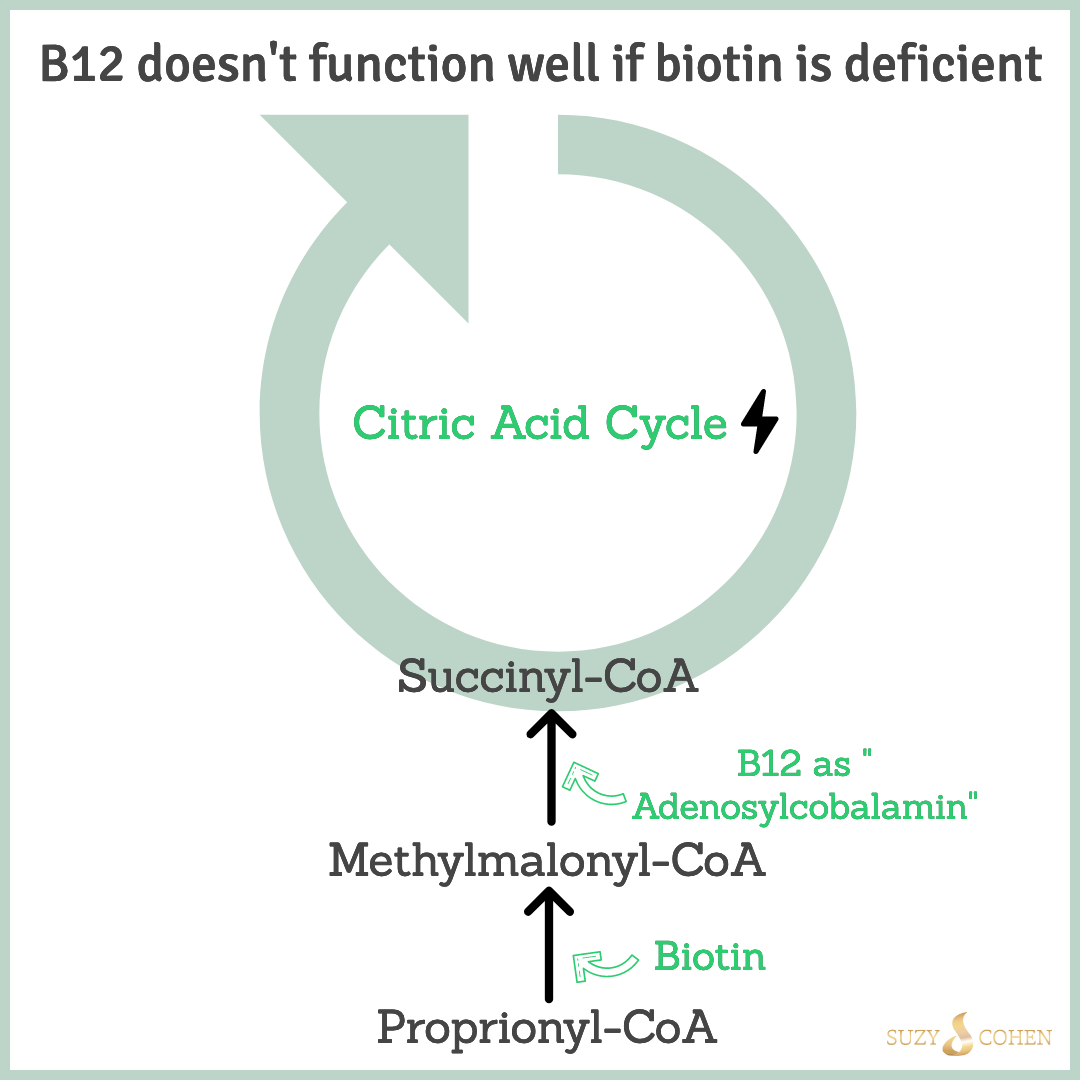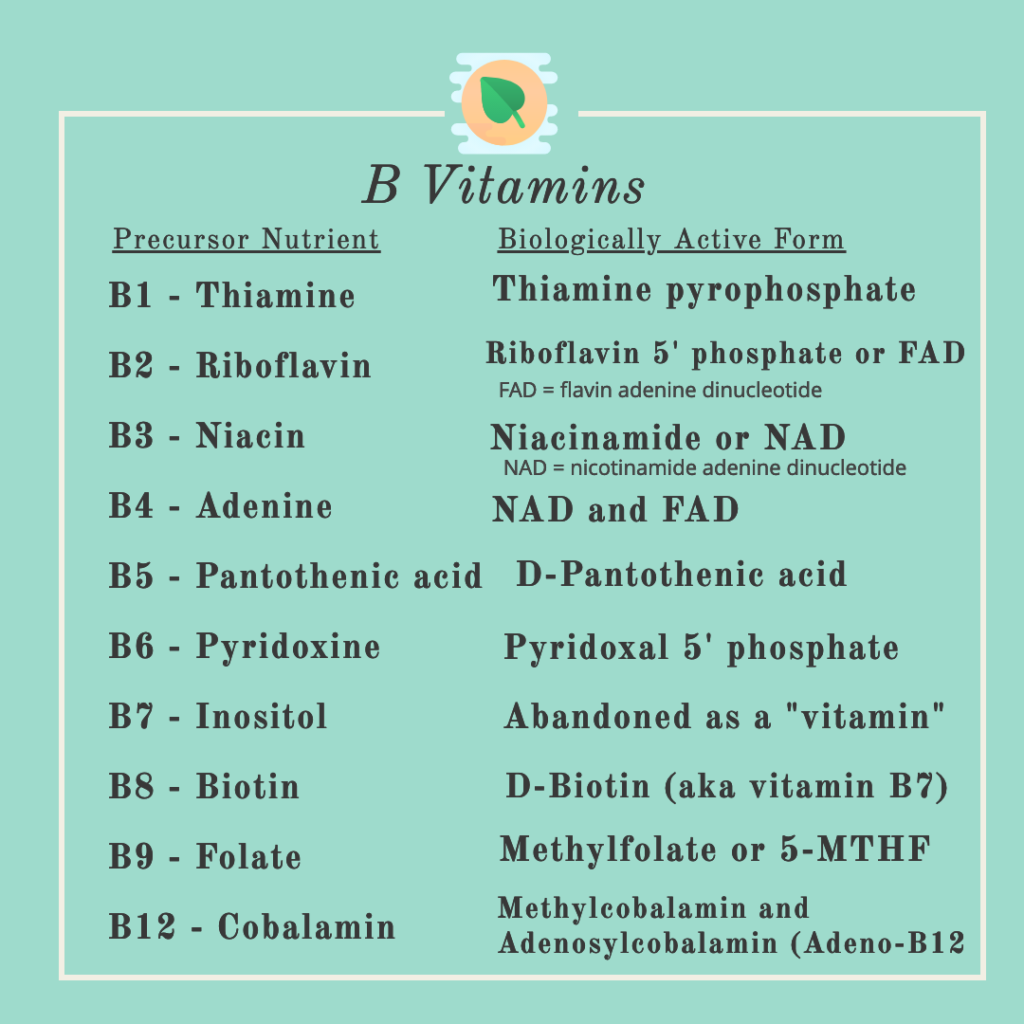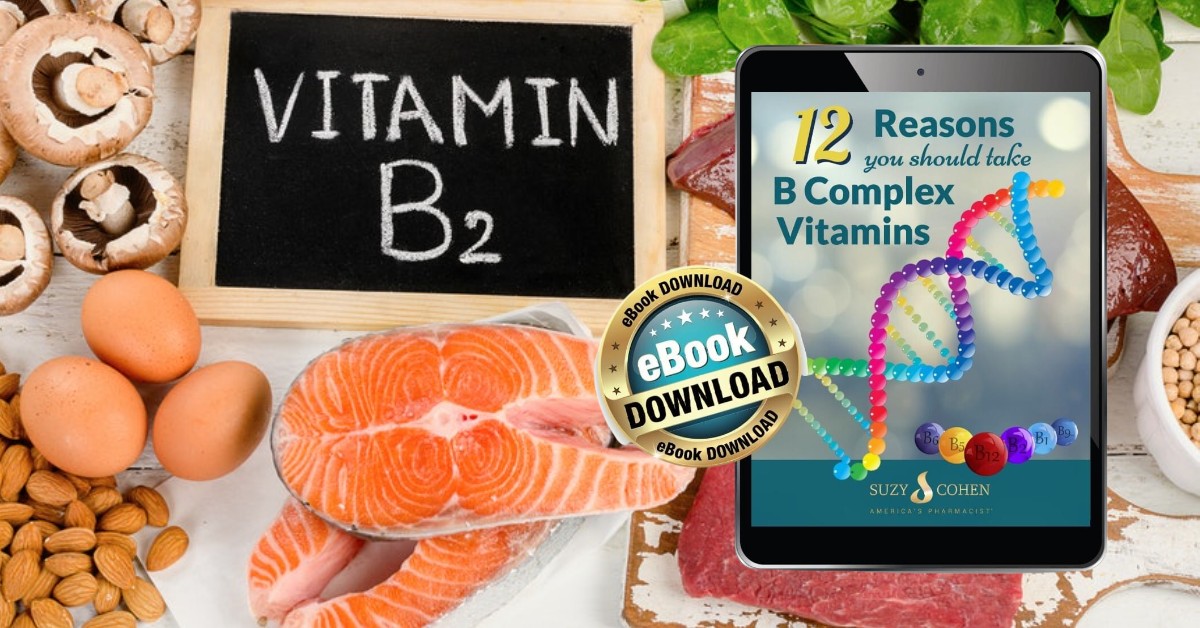Consuming a healthy diet is getting more difficult for everyone lately. So taking supplements to fill in the nutritional gap is a good idea. Today, my focus is on B vitamins because those formulas are very useful to people, not only for energy, but also to control nerve pain and to help beautify the hair, skin and nails. The B vitamins are so important for your life, and unfortunately, they are so terribly misunderstood. What’s worse, millions of people are buying supplements of B complex that do not contain any active ingredients whatsoever! So today I’m simply sharing what I know about B vitamins.
 Most of you associate biotin as the beauty B vitamin, and that is true, however it’s not alone in its ability to support attractiveness. We know that a vitamin B12 deficiency can cause anemia, and therefore also lead to hair loss, pale skin and brittle nails. If you have bluish-black or dark-colored streaks on your fingernails, it might be a sign of B12 deficiency. This condition is reversible with B12 supplementation. But B12 will not work without enough biotin in your body. See the image below and I’ll tell you more in a minute. When vitamin B12 levels are low, your hair follicles may not be able to grow new hair as efficiently, resulting in hair loss. Finally, a deficiency in natural folate can also change the color of your nails and make them rigid and crack.
Most of you associate biotin as the beauty B vitamin, and that is true, however it’s not alone in its ability to support attractiveness. We know that a vitamin B12 deficiency can cause anemia, and therefore also lead to hair loss, pale skin and brittle nails. If you have bluish-black or dark-colored streaks on your fingernails, it might be a sign of B12 deficiency. This condition is reversible with B12 supplementation. But B12 will not work without enough biotin in your body. See the image below and I’ll tell you more in a minute. When vitamin B12 levels are low, your hair follicles may not be able to grow new hair as efficiently, resulting in hair loss. Finally, a deficiency in natural folate can also change the color of your nails and make them rigid and crack.
But I mentioned biotin for more youthful, clear skin and thicker hair.
This is made by you, you know. Most people don’t know that. Biotin is almost always purchased as a supplement, but your probiotics are what manufacture your biotin, and B12. So if you want to make more of your own B vitamins, you could start by thinking about gut health, dietary changes and/or a good probiotic. In as little as 3 months, you could see changes in your hair, maybe even sooner. Many people are impatient and they don’t give the Bs a full chance because if they don’t see a change after the first month, they give up. But you have to think you’ve taken decades to get to this point, and it is going to take more than a few weeks to repair it. Cells have to turn over. New follicles have to grow. Dermal fibroblasts have to regenerate. Blood vessels have to feed the cells in your hair bulb with iron-rich blood, and deliver hormones that control your hair growth. You can’t be anemic and expect that process to continue properly. In other words, skin and hair doesn’t change overnight, it takes months to see a change and it requires all kinds of nutrients, B vitamins, minerals and proteins (think collagen).
What about niacin, the most ‘relaxing’ sedative B of all the B vitamins?
Niacin itself isn’t active. It converts in the body to niacinamide which supports the skin barrier and is the outside surface of your skin. More specifically, it improves texture of skin by minimizing your pore size and it might help with resiliency. Some aestheticians suggest it to help balance oiliness.
Are B vitamins useful for treating acne ?
Biotin and pantothenic acid supplements are useful in treating acne. So is B12. The next part is a very important piece of information that very few people know about.
B12 is 100% dependent on you having enough biotin.
It doesn’t do much without biotin!
So again, vitamin B12 depends on you having an appropriate amount of biotin, which I said earlier is made in your gut via probiotics. Some people supplement with biotin, and that’s fine as long as you’re not over-supplementing.
I saw this a lot when I was in clinical practice. People would test for low serum B12. Their doctor would give them shots of B12 for that, to raise their levels quickly. But high doses of B12 when you’ve been in short supply for years is not a great idea at all if biotin is low.
First, you’d want to prime the body with biotin. That’s my suggestion. Something like 2 to 5,000 mcg daily for about a month, then go ahead with the B12 shot once a month.
What these people don’t realize is that B12 and biotin are probably simultaneously low but only one of those B vitamins gets restored, and I’m saying that’s not a smart thing; it can adversely impact your skin too! It doesn’t even work.
1. We know that normal doses of biotin sometimes help with acne, whereas high doses can cause it.
2. We know that biotin deficiency often occurs with B12 deficiency, and other Bs for that matter! That’s another reason to take a B complex vitamin that contains all the family members, versus just pushing one of the Bs at a high dose.
3. We also know that sometimes B12 causes people to get acne.
Taken together, it is likely that a balanced supply of the B vitamins (in particular B12, biotin and niacin) are worth a try if acne is persistent. There are other natural approaches you can take for acne such as saw palmetto, DIM and zinc. I like all of those options much MUCH better than the drug that teenagers take (that if taken during pregnancy is associated with cleft lip, congenital heart problems and other birth defects).
By the way, if you’re interested in the topic of acne, skin health and having a more attractive complexion, please CLICK HERE and I’ll keep you updated via email.
Effects of B Vitamins
Folate has many uses in the body, for example, it helps make dopamine. It also helps reduce the risk of high blood pressure. It protects DNA. It helps you detoxify and it reduces blood levels of homocysteine, which spawns the release of cytokines involved in cardiovascular disease.
Biotin helps your body make energy and it also keeps your heart rhythm steady. Biotin can break down carbs as well as an amino acid called tryptophan. It plays a role in managing cholesterol.
What about Food and Supplementation?
You can eat your way to better Bs. Since they’re water-soluble, you can’t OD on B-rich foods such as leafy greens, vegetables, meat, nuts and fruits. You can, however, hurt yourself by over-supplementing or taking too high a dose of injectable B vitamins, especially if they are not given in balance. By that I mean, the Bs are ideally taken as if they were family… as a “complex” with all the family members present.
When Should They Be Taken?
B vitamins help make serotonin and dopamine among other neurotransmitters that are potentially stimulating. For this reason, taking them in the morning or at lunch time is a good idea. If you were to take them too close to bedtime, you might experience restlessness or insomnia. Taking a B complex vitamin with food is a good idea as it may minimize any tummy discomfort and nausea that vitamins naturally illicit.
Here are all the B vitamins and their biologically active names. This is what your body has to convert them to, in order for you to better utilize them. The first name is the name of the precursor B vitamin.

As I was saying above, taking B12 shots or B12 supplements by themselves may not be a good idea for everyone. I do that myself (like shots), however, not every single day, and I only do it because I have several genetic SNPs that cause me to be deficient in B12 (and just B12) but you may not know what your genetics are. And if you don’t, the best thing to do is to eat a healthy balanced diet rather than supplement. And if you do want to supplement, take a B Complex vitamin that contains the active forms of each B, so they at least work; so you have a balanced concert of Bs, not just one instrument.
Since B12 requires methylmalonyl-CoA, and that substance cannot be made in your body without biotin, it makes sense that B12 will not even work unless you have some biotin present in your body. Furthermore, if you have a biotin deficiency, it’s not just going to impact your hair, skin and nails like you think. It will affect your nerves, myelin, cognitive thinking abilities as well as melatonin production. That’s because all of those depend on B12, and when you have a biotin deficiency, you have a B12 functional deficiency to go with it! If you’re low in biotin and you start taking shots of B12, or high dose methylcobalamin (or cyanocobalamin) supplements, then your biotin is tilted further out of balance. It is relatively low to begin with, and becomes relatively LOWER once you take the B12. So again, these two Bs are probably best taken together.
This was just one example, I could have easily discussed the combination of taking B12 with a little bit of folate, or pantothenic acid with biotin, or B6 with thiamine. There are interrelationships with all the Bs so keep that in mind before cranking up one of them for months (or years) and ignoring the rest. When you tilt the B vitamins out of order, you tilt your health too, opening up yourself for diagnosis of all sorts of diseases that might be related to a B vitamin deficiency. For example, some older people are put into long-term care facilities under the diagnosis of dementia, but I’ve seen several cured of that with proper nutrient restoration. I worked in nursing homes for 7 years, and this is definitely possible if you know what you’re treating.
So it’s important to do nutrient (and hormone) testing, so you can see what your body is doing. This barbaric approach to treating one symptom at a time with one drug after another is going to be looked upon one day as the darkest age in medicine. Treat your body functionally, as a whole system.
When you think of nutrients, think of them as they appear in nature. Vitamin E is another example. There are 8 isomers of E, but almost all supplements sell you one isomer in supplement form. That’s so silly. There are 4 tocotrienols and 4 tocopherols, so why does taking 1 of the 8 make any sense?
In closing…
If you’re interested in taking a B complex vitamin, you are not alone. B complex is one of the top sellers in the world. It was found to work in tandem with magnesium and vitamin D to support immune function. Many drug muggers exist and deplete your natural stores of B complex vitamins. For example, if you take HRT or hormonal contraception (ie oral contraceptives, pills, patches, pellets, shots) then you might be low in B vitamins. If you take acid blockers, the same! So millions of people take B complex vitamins to restore adequate healthy nutrient levels in your body.
If you take a B complex, take one supplement that contains the full range of B vitamins. They work together, in tandem, and like a great song, there are many instruments that ‘make the music.’ If you do need to punch up one of the Bs in particular, say B12 for example, then take a full range B complex to maintain balance. Remember, when you tilt the B vitamins out of order, you tilt your health too, opening up yourself for diagnosis of all sorts of diseases that might be related to a B vitamin deficiency.
Fun fact: Confusing but true, biotin is referred to as both vitamin B7 and B8. And B7 used to be reserved for inositol until that nutrient was abandoned, and now you see biotin called by both B7 and B8.

Suzy Cohen, has been a licensed pharmacist for over 30 years and believes the best approach to chronic illness is a combination of natural medicine and conventional. She founded her own dietary supplement company specializing in custom-formulas, some of which have patents. With a special focus on functional medicine, thyroid health and drug nutrient depletion, Suzy is the author of several related books including Thyroid Healthy, Drug Muggers, Diabetes Without Drugs, and a nationally syndicated column.


